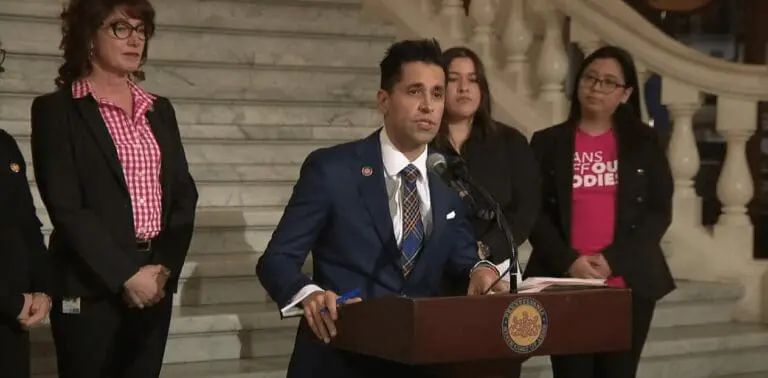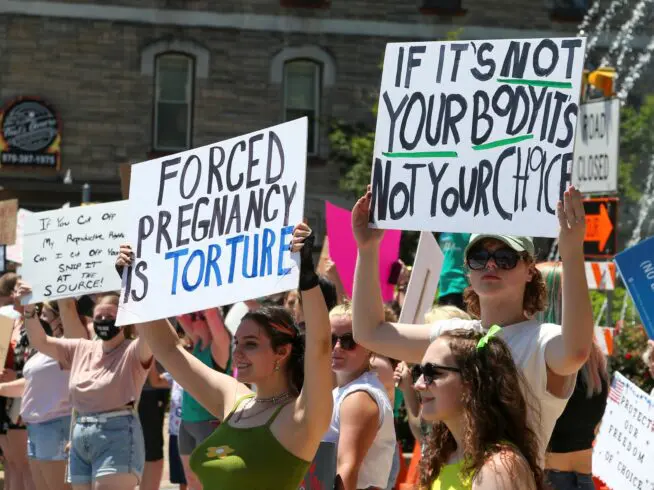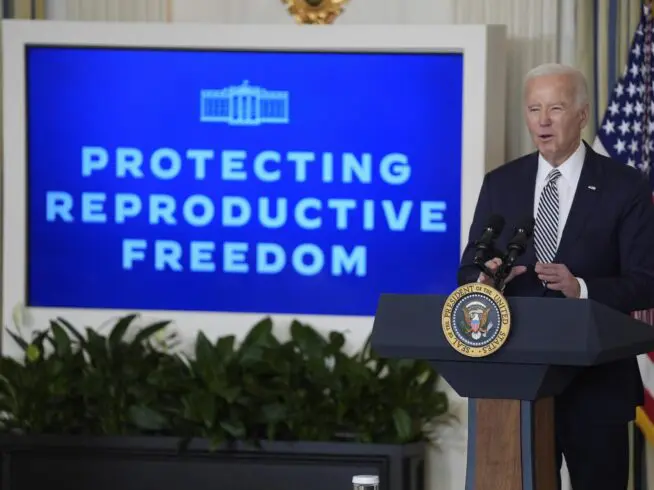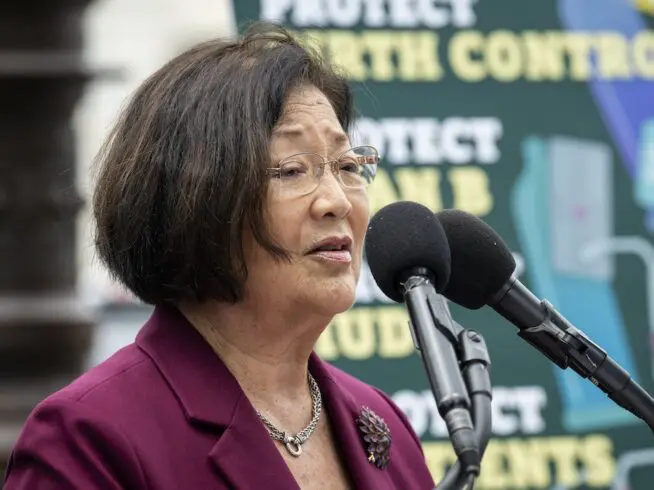PA Democratic lawmakers to introduce legislation that would expand access to abortion care
The bill would roll back a 2011 law that Democrats said led to abortion clinics closing across the state.

A group of Pennsylvania Democratic lawmakers announced Monday that they will introduce legislation to expand abortion access in the commonwealth and undo onerous restrictions that Republican lawmakers placed on reproductive care more than a decade ago.
The bill, soon to be introduced by state Rep. Tarik Khan and 11 Democratic co-sponsors, would roll back a 2011 law that requires abortion facilities to meet the same regulations as ambulatory surgical centers and mandates that abortion providers have admitting privileges at local hospitals. Democratic lawmakers said these are unnecessarily strict regulations that do not improve patient safety but rather are intended to shut down health centers providing safe abortion care.
A Republican-led state House and Senate passed the 2011 law, which was signed by Republican Gov. Tom Corbett.
This 2011 law is an example of what is commonly known nationwide as a TRAP law, or “targeted restrictions on abortion providers,” and Democratic lawmakers said during their Monday press conference in Harrisburg that it has led to abortion clinics closing across the state and dangerously restricted people’s ability to access abortion. Abortion is legal through the 23rd week of pregnancy in Pennsylvania.
“Unfortunately, senseless restrictions still exist in Pennsylvania that block access to safe abortion,” Khan, a Philadelphia Democrat who is the lead sponsor of the pending legislation, said at the press conference. “Most notably, in 2011, there was a bill that was passed that forced devastating mandates on abortion providers, passed into law by an anti-choice governor, Gov. Corbett, and a Republican Legislature.”
Khan, who is a nurse practitioner, went on to explain that the 2011 law forced health clinics to undergo expensive structural changes that were mandated not for patient safety but to limit access to abortion at a time when abortion was still a constitutional right in the United States.
“Such modifications included mandating specialized elevators, specialized flooring, specialized HVAC units, even had restrictions for how big the hallways could be, the size of procedure rooms, which unfortunately caused many abortion facilities to close and limits even to this day access to safe abortion care,” Khan said. “It also prevents other facilities that would open from opening because of these expensive and unnecessary requirements.”
Republican majorities in state legislatures across the country, including in Pennsylvania, have passed TRAP laws in the 50 years following the U.S. Supreme Court’s Roe v. Wade ruling in an attempt to restrict abortion care. In 2014, the American College of Obstetricians and Gynecologists called for a repeal of TRAP laws, and leading medical associations have publicly condemned the laws. The American Medical Association and the American College of Obstetricians and Gynecologists, for example, wrote in a 2015 court brief that a Texas law requiring abortion facilities to meet ambulatory surgical facilities’ requirements and abortion providers to have admitting privileges at a local hospitals does “not serve the health of women in Texas but instead jeopardizes women’s health by restricting access to abortion providers.”
“These restrictive laws do not deter abortions,” Khan said. “They do not decrease abortion rates. What they do is, they cause barriers to receiving abortion care, and they cause delays, which increase risks to patients. And make no mistake, this affects patients who are most at risk for health disparities: patients of color, low-income patients, our patients in our rural areas, our patients in our most urban centers that are health care deserts.”
Melissa Reed, president and CEO of Planned Parenthood Keystone, told the Pennsylvania Independent’s sister publication, the Wisconsin Independent, during a roundtable discussion on Jan. 22 that it’s imperative that Pennsylvania lawmakers repeal TRAP laws that endanger patients across the state.
“There are still barriers in place for people who are seeking care that we are working really hard to get overturned or waived in this state, which I think is so important,” Reed said.
Democratic lawmakers are addressing TRAP laws at a time when abortion remains legal in Pennsylvania following the U.S. Supreme Court’s decision in 2022 in Dobbs v. Jackson Women’s Health Organization that overturned Roe and its affirmation of a constitutional right to abortion — but tenuously so, abortion care advocates say. Democrats, who typically back legal abortion in Pennsylvania, have had a one-seat majority in the state House since last year, but that majority is once again up for grabs in a February special election. The Pennsylvania Senate has for decades been under Republican control. Pennsylvania’s governor, Josh Shapiro, is a Democrat who supports abortion rights; he’s up for reelection in 2026.
In addition to backing measures meant to restrict access to abortion, Pennsylvania Republicans in 2022 tried to push through a constitutional amendment that would have effectively banned abortion in the state.
“Over 50 years ago, our mothers and grandmothers won this fight for us,” state Rep. Danielle Friel Otten, a co-sponsor of Khan’s legislation and a co-sponsor of legislation to enshrine abortion in the stateConstitution, said during Monday’s press conference. “They didn’t win it completely, but they brought it a long way. And over the last 50 years, those wins have been chipped away at and chipped away at and chipped away at until just a year ago those rights were, in an instant, taken away.”
Republican lawmakers’ chipping away at abortion rights in Pennsylvania has left large swaths of the state with little access to abortion care, state Rep. Gina H. Curry said. She noted there are now 17 abortion care clinics remaining in Pennsylvania.
“Where are women who can’t get access supposed to go?” Curry asked at the press conference. “We have put ourselves in a situation where we have accessibility, affordability issues, and where women do not feel safe.”
Signe Espinoza, the executive director of Planned Parenthood Pennsylvania Advocates, said Khan’s upcoming legislation is crucial to address the barriers to abortion care that currently exist in Pennsylvania.
“Pennsylvanians are traveling hundreds of miles, reaching centers and being told that their one-day appointment now became two, being told that their health care will not be covered, even though it is a life-saving procedure, and being harassed before they reach check-in. The list goes on,” Espinoza said. “This is the reality of abortion care in Pennsylvania. We need to do better for Pennsylvania, and bills like this are just a step in the right direction.”




